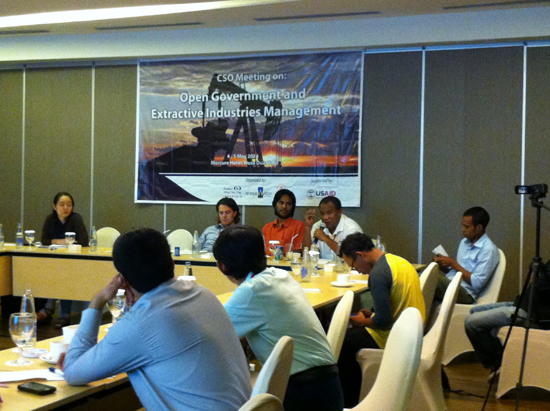
OGP: Shedding Light on Natural Resource Management in Asia Pacific
Recently, Indonesia hosted the first Asia Pacific Open Government Partnership (OGP) regional conference in Bali, where civil society organizations (CSOs) urged governments to safeguard and promote free civic space, adopt governance as a standalone goal in the post-2015 development agenda, and formally join OGP.
"OGP is designed to transform the values of openness, accountability and good governance through public participation and technological innovation," said Dr. IR. Kuntoro Mangkusubroto, chairman of the OGP Steering Committee, speaking to the theme of "innovative openness." Indonesia joined OGP in September 2011 and is one of 64 member nations today.
In side meetings before the conference, Publish What You Pay (PWYP) Indonesia, the Institute for Essential Services Reform and the Natural Resource Governance Institute (NRGI) met with CSOs to link existing initiatives in the extractive sector to OGP. Such initiatives include building a regional framework for the Association of Southeast Asian Nations (ASEAN), establishing a spatial transparency harnessing data from the Extractive Industries Transparency Initiative (EITI), and strategically engaging with oil, gas and mining companies and governments using social accountability tools.

At its regional meetings in Indonesia, the Open Government Partnership issued 11 recommendations for Asia Pacific governments.
Because Asia Pacific countries differ politically and economically and therefore manage their natural resources differently, there is no one-size-fits-all model for promoting openness. However, the growing importance of transparency, particularly in the extractive sector, is undeniable. Various governance indicators confirm that countries in this region still grapple with limited transparency and accountability. According to NRGI's Resource Governance Index, the region performs at a level similar to sub-Saharan Africa.
Opacity in taxation is a primary concern. Some 82 jurisdictions in the world function as tax havens, according to the Financial Secrecy Index. These tax havens account for half of all cross-border trade, adds the Organization for Economic Co-operation and Development (OECD). The revenue losses are substantial. Global Financial Integrity estimates that the developing world lost $5.9 trillion in illicit financial flows from 2002 to 2011, with illicit outflows increasing at an average rate of more than 10 percent per year, while Le Billon reports that the extractive sector accounts for most of this revenue loss.
Openness in the extractive industry is critical. The group therefore recommended that governments in the Asia Pacific region take the following actions:
- Join the Open Government Partnership
- Join the EITI to promote transparent and accountable management of their natural resources
- Adopt legislation similar to the US Dodd Frank Act (2012) and the EU's new Accounting and Transparency Directives (2013)
- Promote fair distribution of global profits by endorsing the OECD Base Erosion and Profit Shifting (BEPS) action plan, which seeks to change the transfer-pricing model and acknowledge country-by-country reporting and automatic information exchange.
- Put free, prior and informed consent into national laws and policies
- Share the benefits of oil, gas and mining with communities impacted by extractive operations
- Promote regional cooperation to standardize or harmonize policies with regard to taxing oil, gas and mining companies
- Support and encourage civil society to focus more on obtaining data, while helping government and companies share data more easily
- Support ASEAN efforts to promote OGP
- Use data generated by the community through innovative technology, which is often as rigorous as government data.
- Implement spatial transparency to mitigate social conflicts
Citizens and governments in the region should strive to ensure that natural resource endowments in their respective countries bring benefits, not a curse. For this to happen, CSOs must endorse OGP and EITI as multi-stakeholder platforms that on one hand hail openness as a core principle and on the other hand promote accountability. The wellbeing of current and future generations depends on it.
Roslita Arsyad is NRGI's Asia Pacific regional associate. Emanuel Bria is NRGI's Asia Pacific regional senior associate.
Authors

Roslita Arsyad
Asia Pacific Officer
